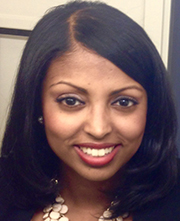Pathway to Medicine: Linda Suleiman, MD

My mother and father grew up in Mogadishu, Somalia and immigrated to North America at the height of the civil war. My mother was an anesthesiologist and my father worked for the Port Authority. They had never imagined leaving their home in the middle of their thirties and starting anew with three children under the age of 10 and my teenage cousin. I was only a child when we left, but I always knew I wanted to practice medicine, just like my mother. She was from a low-income family where her mother never learned to read or write. The importance of education was evident during our childhood because of the opportunity it gave her to help others. During the civil unrest, my mother was one of the only physicians who still remained in Mogadishu. In the war-torn country of Somalia, there was literally nothing onto which people could hold, including one’s own family.
We were displaced to Hamilton, Ontario in Canada, but we did not remain helpless in the midst of desperation. My mother and father, two educated Somalis with graduate degrees, worked at the local racetrack doing janitorial work while going back to school. Her medical degree was not recognized in North America at that time. I saw how devastated my mother was not being able to practice medicine given the hard work, sacrifice and determination it took for her to achieve that lifelong goal. However, she continued to help others, and went on to work for several government agencies that sought to help new refugees settle in Canada. The fact that my mother could not use her healthcare skills only gave me more drive to become a physician.
I completed my undergraduate studies in physiology and neurobiology at the University of Maryland, but it wasn’t until I attended Howard University College of Medicine that I wanted to become an orthopaedic surgeon. I would walk the hallways and marvel at the pictures on the walls of previously trained and impactful African American surgeons like LaSalle Leffall, MD. These surgeons, and other physicians on these walls, trained at a time when they were the only doctors providing care for the underserved, they championed access for all at a time in our country where healthcare was a privilege and not a right. Howard gave me the will, purpose and confidence to seek a surgical sub-specialty in which the majority of physicians were white males. I was in an environment where women and African Americans were encouraged to pursue orthopedics, which was not the case for friends of mine at majority institutions. I did not realize this until my first away sub-internship elective. There, I was asked, for the first time, “Why are you doing orthopedics and not pediatrics or OB-GYN?” I remember this distinctly because I was asked this same question from 20 other orthopaedic programs.
Northwestern was distinct in my mind, at least initially, because they asked a different question. During my fourth-year sub-internship elective at Northwestern Memorial Hospital (NMH), I was asked, “What do you hope to accomplish in orthopedics?” This question continues to resonate with me. Here, there was an expectation from the beginning that I belonged, that I was of value and that I had something to offer not only this institution but also my sub-specialty. I share this story when I talk to medical students of color and women interested in pursuing orthopedics. I tell them to search for a program that is asking this question, or something like it. I am extremely grateful to the Office of Diversity and Inclusion for affording me the opportunity to rotate at Northwestern. From the day I arrived on campus for the residency showcase as a third-year medical student and during my time in the visiting student clerkship, I have felt valued and supported by the Office of Diversity and Inclusion as well as by the general Northwestern community.
I was the first African American woman to graduate from the orthopaedic surgery program at NMH. This has weighed on me heavily and has only pushed me to mentor those who should follow in my footsteps. My passion for the field of orthopedics and my dedication to my community are a result of my childhood experiences. I owe it to my family, who sacrificed so much, to help bring the next generation forward.